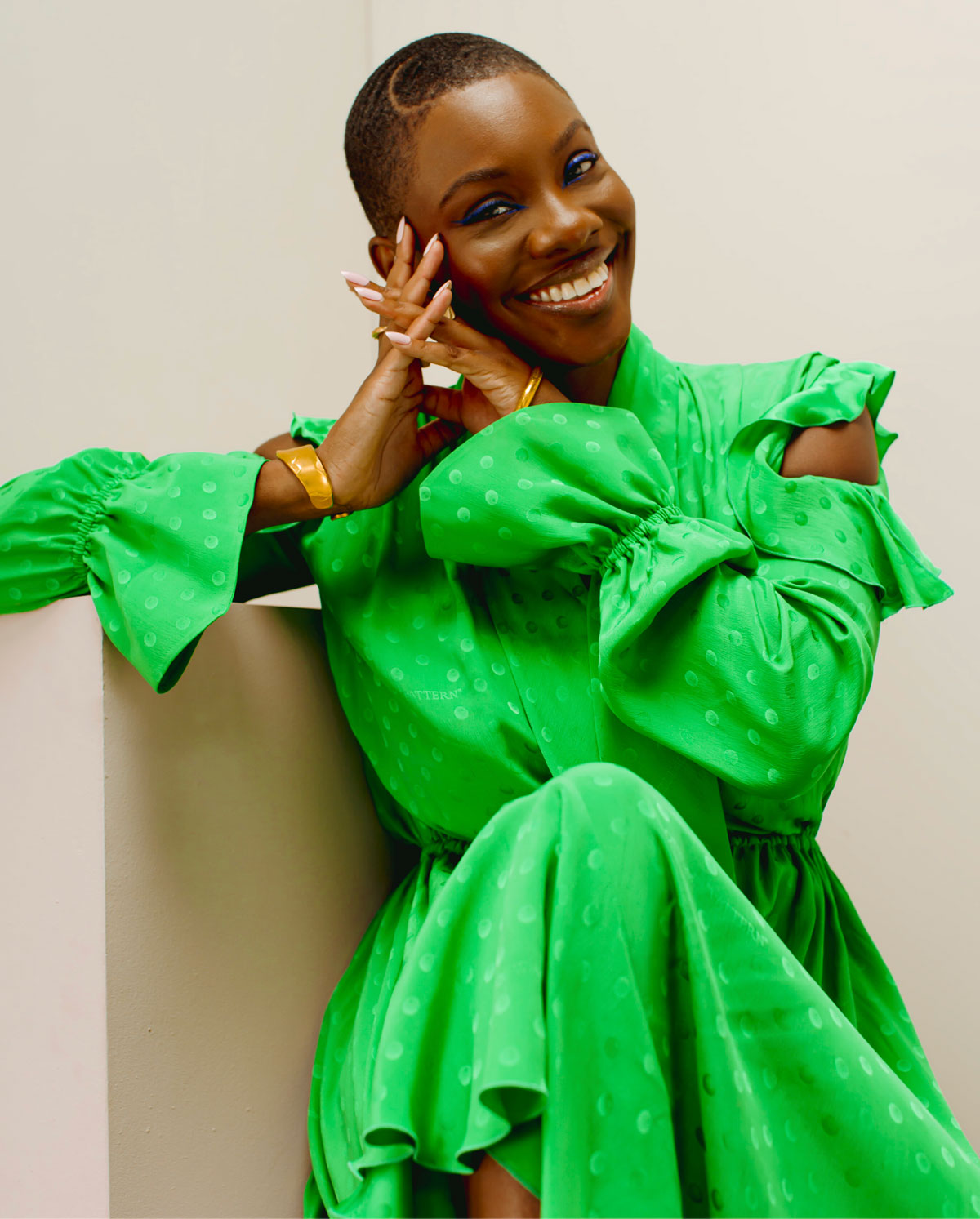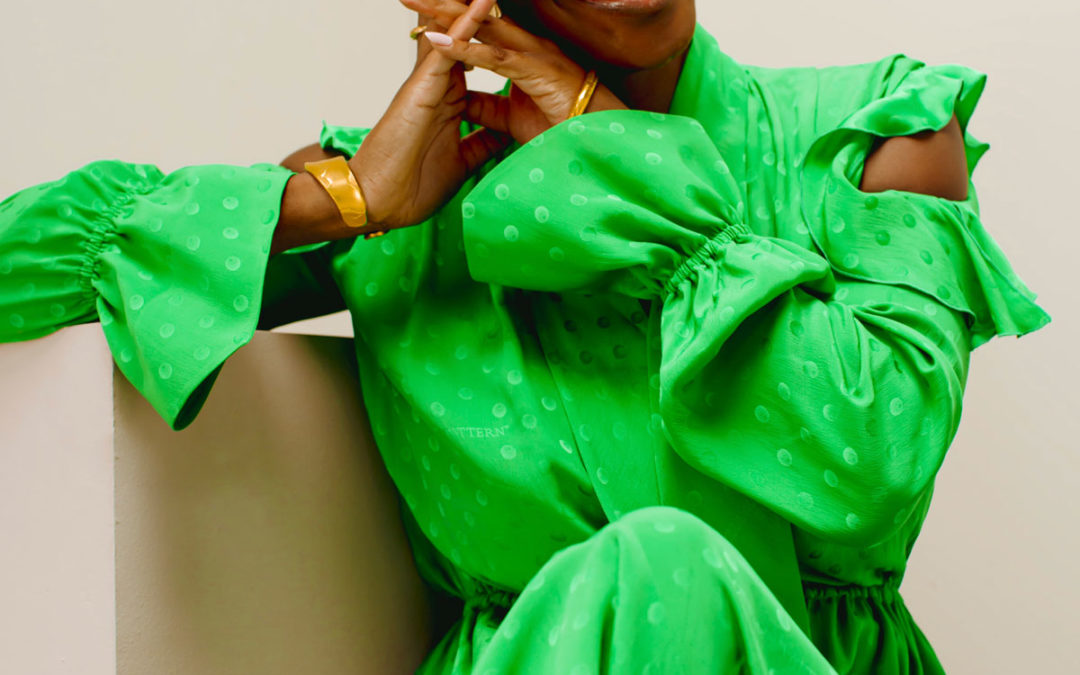YOMI ADEGOKE: ‘I OWE MY CAREER TO THE INTERNET, BUT I’M TERRIFIED OF IT’
Her novel, The List, is already being touted as one of the major books of the summer and is set to be adapted for TV. Hattie Crisell talks authenticity and cancel culture with the writer of the moment

IN 2017, YOMI ADEGOKE was working as a producer at Channel 4 News when the #MeToo movement hit. A trickle of public accusations of sexual harassment and assault quickly became a flood, with dozens of influential men exposed for bad behaviour. In the aftermath, lists of further abusers were sometimes circulated online, often from anonymous sources. Watching this unfold on the barely regulated platforms of social media, Adegoke felt torn.
‘As a feminist, I thought, “This is amazing. Systems, from the police to HR departments, have repeatedly let women down – now finally those women are being heard,”’ she says. ‘But as a journalist, I was used to Ofcom regulation and lots of use of the word “allegedly”. We were also in the midst of a fake-news crisis. So I felt like, this is a really important thing but, despite good intentions, could it potentially do harm?’
This knotty ethical dilemma is at the heart of Adegoke’s debut novel, The List. The plot follows Ola, a journalist at a feminist magazine, who is one month away from marrying Michael, who has just landed a prestigious job as a presenter. They both enjoy minor fame online and a following that considers them #couplegoals, so when Michael appears on an anonymous list, accused of harassment and assault, it turns their lives upside down. Ola agrees with the principle of exposing abusers, but now has to face the reality, and everything she believed about Michael is thrown into question while she tries to get to the truth.
The conversation about abuse may be less heated than it was a few years ago, but questions of cancel culture and social-media trolling feel as resonant as ever. One of the strengths of Adegoke’s novel is that it presents a complicated question and resists giving a simple answer: is it right for someone to be named publicly as an abuser without going through a legal process?
‘IN PURSUIT OF GOSSIP, WE DON’T SLOW DOWN AND ENGAGE WITH THE FACTS’
I don’t give the answer because I don’t know the answer,’ says Adegoke. ‘I’m not sure I ever will. What’s interesting to me is that the list definitely has good intentions – but the internet has a kind of reckless, unchecked power that I don’t think we have yet come to terms with. I think we’re sleepwalking into a crisis. Nothing’s really being done to regulate it.’
It’s probably wise that she’s exploring these issues offline in a novel, rather than attempting to discuss them online, where it’s difficult to hold a conversation with nuance.
‘The idea of putting this in a Twitter thread makes me feel physically sick,’ she says, laughing. ‘The algorithms thrive off polarisation and people being divisive, so any discussion of this would immediately be heated. What I try to look at in the book is that there is so much performance involved. People feel they need to be slightly more vitriolic or sarcastic than they would be offline, because other people can see you. They need to perform their anger.’
There are parallels between Ola and Adegoke, who also built a public profile in her twenties (she’s now 31) with 2018’s best-seller Slay In Your Lane – a guide to life for Black British women, co-written with her best friend (and Grazia’s work columnist) Elizabeth Uviebinené. Adegoke has 32,000 followers on Instagram and roughly the same number on Twitter. ‘I very much owe my career to the internet, but am simultaneously terrified of it,’ she says. ‘My long-term plan is absolutely to divest myself of social media at some point.’
Working out how to handle her platform has taken time. ‘I was super-free on Twitter when I first joined,’ she says. ‘I would tweet random things that came into my head, and I was a lot less cagey around my personal relationships. But now I use all my social media as though it’s LinkedIn – it’s basically a highlights reel, used for promotion. I know that’s not the fashionable thing to say in the age of relatability, but I feel absolutely no responsibility to be relatable. I’m a writer, and I don’t feel like I owe that to someone for following me.’
You won’t see her getting personal online, then, or making ‘Instagram versus reality’ content. ‘We’re all adults, and surely most of us are engaging with social media in the same way,’ she says. ‘I know your life isn’t perfect and you should know that mine isn’t. I can’t dedicate time to telling people, “By the way, I also bleed and cry and shit, like we all do.” I have all kinds of things falling apart in my life, but no, I’m not going to show you – because you’re a stranger.
A few things are certainly going very right for Adegoke, however; one of her recent highlights was the news that The List will be adapted into a major TV series, co-developed by the BBC, A24 and HBO Max. So what are her hopes for the novel itself? ‘What I want is quite boring,’ she says. ‘I want people not to jump to the worst conclusions about what they see online. Sometimes, in pursuit of gossip, we don’t slow down and engage with the facts. I think that’s less fashionable, it’s less fun, but it’s the right thing to do.’
She’s hoping for a little bit of nuance, then – which is best found offline.
‘The List’ (4th Estate) is out now
(Test)
PHOTO: CHRISTINA EBENEZER

